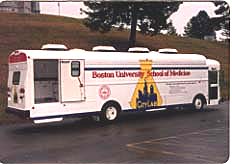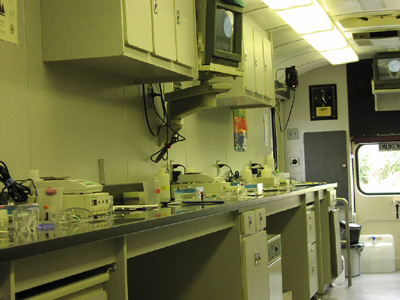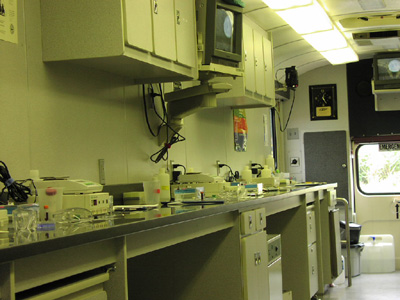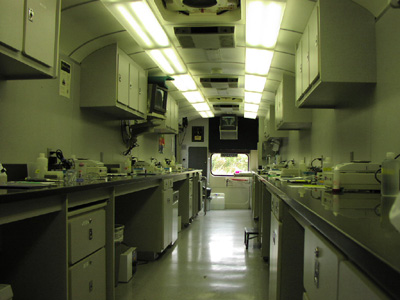More information about the MobileLab

![]()
Funding for the MobileLab is provided by the National Institutes of Health. Previous supporters include The Charles Hayden Foundation, Neighborhood Jobs Trust of the City of Boston, USTRUST, Genzyme, and the Massachusetts Biotechnology Council.
The MobileLab provides continuity and enrichment of the CityLab experience by taking the program on location. Quality science education is the impetus for the design and implementation of the MobileLab. We recognize that one or two visits to BUSM CityLab may not be sufficient for students to develop confidence and familiarity in the laboratory that promotes independent and creative thinking. Our experience with the CityLab SummerLab has shown that the directed inquiry approach inherent in the CityLab activities segues nicely into more open ended inquiries. Whereas the SummerLab provides this opportunity for a small group of students, the Mobile Laboratory allows many students to have the same opportunity to develop a deeper understanding of molecular biology through hands-on experiences.
Click here for an article written about MobileLab.
The MobileLab has been a standard for the development of similar programs throughout the country. The MobileLab has been replicated at the University of North Carolina (UNC) at Chapel Hill, one of the CityLab satellites. UNC – Chapel Hill received major funding from Glaxo Wellcome, Inc. to build Destiny, “the best thing in science education to hit the road.” BUSM CityLab modules will be taught on board their traveling science laboratory, which also includes IBM provided computers. See April 6, 2000 press release.
Another MobileLab is on the drawing board in Connecticut. The BioBus is a collaborative project among CURE (Connecticut United for Research Excellence), Connecticut Innovations and local industry and state partners. Click here for more information on the BioBus.
Design

 The MobileLab is built on a BlueBird “Concept 2000” chassis with a 210 hp diesel engine. It was customized by the Ohio Bus Specialty Vehicles in Canton, Ohio.
The MobileLab is built on a BlueBird “Concept 2000” chassis with a 210 hp diesel engine. It was customized by the Ohio Bus Specialty Vehicles in Canton, Ohio.
The design of the Mobile Laboratory was based on our experiences in effective laboratory instruction at CityLab. It provides students access to equipment and instruction with a minimum of movement.
The roof has been raised 8″ for a total interior height of 84″. Each workstation is 50″ long and 22″ deep and accommodates two students. Bench tops are 36″ high and run the length of the interior on both sides. The instructor’s station can be set up at the front or rear of the lab. A remotely controlled camera at the instructors station enables students to see the demonstrations on video monitors located in the front, center, and rear of the vehicle. Six internal speakers throughout the lab insure all students can hear the instructor who will be equipped with a cordless microphone. The monitors are also connected to a VCR to display videos. A sink with both deionized and fresh water faucets is located at the rear of the bus. Cup sinks and two electrical outlets are provided at each station
The design takes into account specific needs associated with a self contained molecular biology laboratory. A -20oC freezer and 4oC refrigerator are available for storing perishable supplies. Cabinets are located above and below countertops. Three cabinets double as carts which can be used to load and unload the lab. A wheelchair lift provides disabled students access and also facilitates loading and unloading heavy equipment. AC power is supplied by a shoreline, capable of plugging into a 220 or 120 volts outlet, or a 20 kW generator. Both supply sufficient amperage to run all onboard equipment.
Additional accessories include four stabilizers that automatically level the lab and keep it steady during use. Climate control is regulated by four air conditioner/heaters mounted on the roof as well as five baseboard heaters. Portable stairs can be attached to the rear door enabling easy access at both the front and rear of the vehicle.